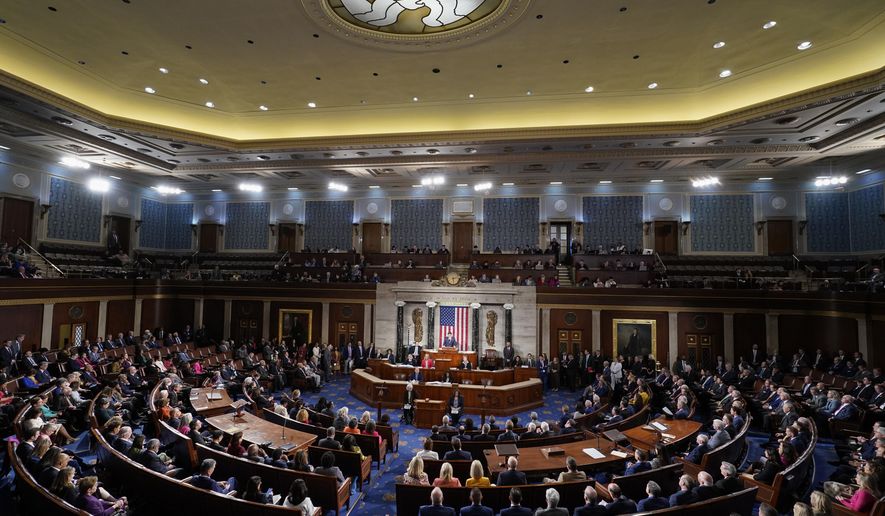Republicans took control of the House last year with a pledge to use the power of the purse to reel in President Biden’s woke agenda.
The first go-round didn’t fare so well.
An attempt to ban the Interior Department from spending taxpayers’ money on “ecogrief” counseling for employees was deleted from the department’s final spending bill. So was an attempt to shut down the Energy Department’s equity action plan.
A ban on flying the rainbow “pride” flag outside government agency buildings didn’t make it into the bill, nor did a provision blocking money for the National Museum of the American Latino, a Smithsonian project that Republicans said has taken a hard-left turn with its telling of Hispanic history.
The decisions are all part of the $467.5 billion spending bill Congress revealed over the weekend, which is due for votes this week.
It covers six of the dozen annual spending bills for fiscal year 2024, funding Veterans Affairs, the Environmental Protection Agency, the FBI, food stamps and other federal programs. Still to come are six bills that cover Homeland Security and the Defense Department.
SEE ALSO: Kissing ‘woke’ goodbye: VA chief reverses ban on iconic WWII sailor-smooch photo
Conservatives called it a missed opportunity.
“We have very few opportunities to eliminate such radical programming, and we cannot afford to waste those opportunities by watering down appropriations riders such as this,” said Rep. Harriet Hageman, Wyoming Republican.
She was a particularly vocal critic of the ecogrief funding for U.S. Fish and Wildlife Service employees to be counseled on handling anxiety linked to fears of climate change or an otherwise changing environment.
After The Washington Times revealed the spending last year, House Republicans included a provision in their original Interior Department spending bill to shut it down.
The final version, negotiated with the Democratic-led Senate, drops the ban and asks the agency to brief Congress within 90 days on its activities.
Senate negotiators also knocked out Republicans’ attempt to stop versions of the pride flag.
House Republicans had written a list of approved flags into several bills that cleared their chamber. Allowed flags included the U.S. flag, state, tribal or territorial flags, department and agency seals, and the POW/MIA flag.
Rep. Ryan Zinke, Montana Republican and a member of the Appropriations Committee, said Republicans fell short. Although the spending bill doesn’t mandate funding for ecogrief and other DEI efforts, it doesn’t stop them.
“Of course I’m disappointed, but that doesn’t mean I’m going to blow up the bill and not take the incremental wins we were able to secure,” he told The Times.
Among the woke-policy wins the Republicans claimed were blocking money for Mr. Biden’s conservation equity agreements at the Agriculture Department, derailing an increase for diversity, equity and inclusion programs at the VA and cutting $275 million from what the president sought in environmental justice funding at the EPA.
“House Republicans brought light to wasteful DEI funding and prevented increases to those programs — and in some instances even secured decreases, a feat when faced with a Democrat president and divided government,” a Republican aide told The Times. “If the Democrats had it their way, these programs would have gotten significant increases.”
This bill marks the first time Republicans have overseen earmark spending since they killed the practice in 2011, and the DEI agenda was fought on that battleground, too.
Republicans blocked spending that lawmakers tried to earmark for an LBGTQ community center in Reading, Pennsylvania, and The Pryde, a housing project for LBGTQ senior citizens in Hyde Park, Massachusetts. The bill did restore $1 million in earmarked money for Philadelphia’s William Way LGBT Community Center.
One surprising DEI fight was over the Smithsonian Institution’s Hispanic museum, which is in the works but is getting a test run with the Molina Family Latino Gallery, now part of the National Museum of American History.
Republicans said the history lessons in the gallery portrayed Hispanics as oppressed minorities. During a debate in the committee, one Republican lawmaker said the exhibit took a “patronizing, quasi-racist attitude.”
Powered by those complaints, Republicans included language in their bill last year to block new work on the museum and to shut down operations of the current gallery.
The final bill drops the ban and specifically includes $28 million to be divided among the Latino museum, the American Women’s History Museum, also in the works, and a skeletal remains repatriation program.
The Times reached out to several Republicans involved in the museum effort, but none provided comment for this article.
Rep. Rosa DeLauro of Connecticut, the ranking member on the House Appropriations Committee, celebrated Democrats’ wins over what she called “extreme cuts and policies proposed by House Republicans.”
“We are protecting communities in need and moving our country forward,” she said while cheering the bill.
Mr. Zinke said Republicans started with limited maneuvering room, with a slim majority in just one chamber of Congress compared with the Democratic majority in the Senate and control of the White House.
He was optimistic about the future and the chance for a Republican president and the bills Congress is writing for fiscal year 2025.
“I think with such favorable conditions heading into November, we are likely to see a [continuing resolution] past Election Day, and you’ll see a lot more Republican priorities staying in the bill for FY25,” he said. “At that point, Democrats will be desperate to get what they can and be better negotiating partners before losing the other two branches in January.”
• Stephen Dinan can be reached at sdinan@washingtontimes.com.




Please read our comment policy before commenting.